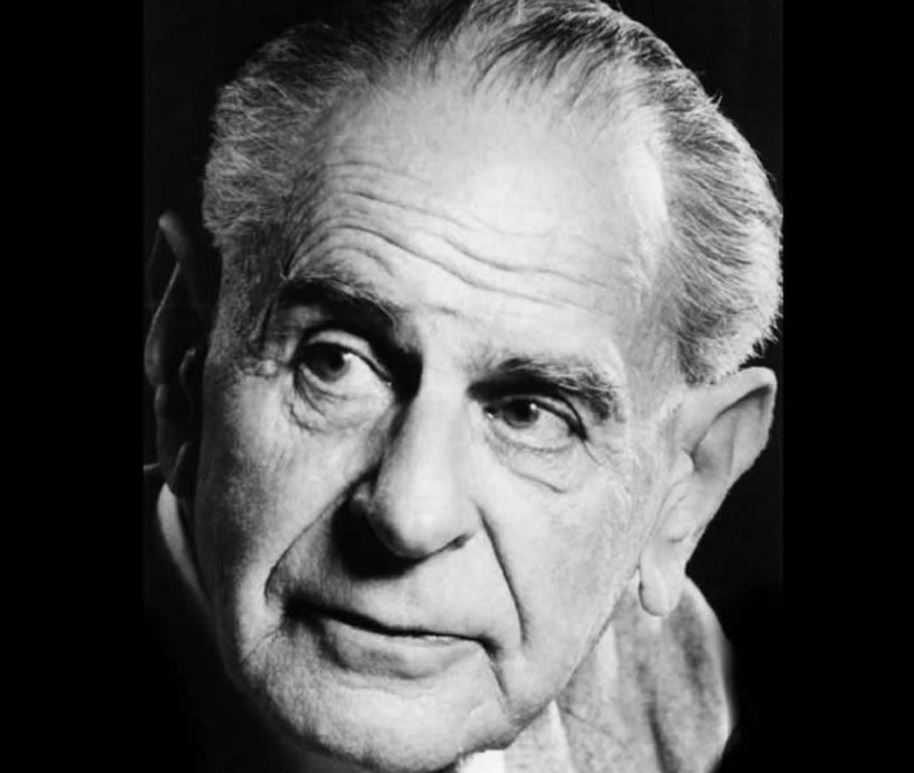Sir Karl Raimund Popper (d. 1994) is considered one of the greatest philosophers and scientific minds of the 20th century.
Born into an upper middle-class family in Vienna in 1902, Popper grew up surrounded by books and learning. His father was a bibliophile, and the younger Popper inherited this love for the written word. Though his family was of Jewish ancestry, Popper was baptized in the Lutheran Church; but as a young man he grew more interested in politics than religion. He flirted with Marxism before embracing an ideology of social liberalism that he carried throughout his life.
He enrolled in university in 1922, received a doctorate in psychology in 1928, and shortly thereafter published his theory on falsifiability, which defined testability of a hypothesis as a criterion of science. After a stint at the University of New Zealand, where he served as a lecturer in philosophy, Popper became professor of logic and the scientific method at the University of London.
Popper died in 1992 from organ failure associated with cancer. He is remembered for his prolific writing, penetrating mind (that was as broad as it was deep), and independent thinking. Below are a few selections of his writing to serve as food for thought.
1. “There is an almost universal tendency, perhaps an inborn tendency, to suspect the good faith of a man who holds opinions that differ from our own opinions.” – As quoted in On the Barricades: Religion and Free Inquiry in Conflict (1989)
2. “Philosophers should consider the fact that the greatest happiness principle can easily be made an excuse for a benevolent dictatorship.” – As quoted in 1,001 Pearls of Wisdom (2006)
3. “No rational argument will have a rational effect on a man who does not want to adopt a rational attitude.” – The Open Society and Its Enemies (1945)
4. “[W]e do not choose political freedom because it promises us this or that. We choose it because it makes possible the only dignified form of human coexistence, the only form in which we can be fully responsible for ourselves.” – On Freedom (1958)
5. “True ignorance is not the absence of knowledge, but the refusal to acquire it.” – As quoted in “In Our Time’s Greatest Philosopher Vote” on In Our Time.
6. “The genuine rationalist does not think that he or anyone else is in possession of the truth; nor does he think that mere criticism as such helps us achieve new ideas. But he does think that, in the sphere of ideas, only critical discussion can help us sort the wheat from the chaff.” – All Life is Problem Solving (1999)
7. “You can choose whatever name you like for the two types of government. I personally call the type of government which can be removed without violence “democracy,” and the other “tyranny.” – As quoted in Freedom: A New Analysis (1954)
8. “It seems to me certain that more people are killed out of righteous stupidity than out of wickedness.” – Conjectures and Refutations: The Growth of Scientific Knowledge (1963)
9. “Since we can never know anything for sure, it is simply not worth searching for certainty; but it is well worth searching for truth; and we do this chiefly by searching for mistakes, so that we have to correct them.” – In Search of a Better World (1984)
10. “The true Enlightenment thinker, the true rationalist, never wants to talk anyone into anything. No, he does not even want to convince; all the time he is aware that he may be wrong. Above all, he values the intellectual independence of others too highly to want to convince them in important matters.” – On Freedom (1958)
11. “If we are uncritical we shall always find what we want: we shall look for, and find, confirmations, and we shall look away from, and not see, whatever might be dangerous to our pet theories.” – The Poverty of Historicism (1957)
12. “If God had wanted to put everything into the universe from the beginning, He would have created a universe without change, without organisms and evolution, and without man and man’s experience of change. But he seems to have thought that a live universe with events unexpected even by Himself would be more interesting than a dead one.” – As quoted in Omnipotence and Other Theological Mistakes (1984)
—
Jon Miltimore is the Senior Editor of Intellectual Takeout. Follow him on Facebook.
















Leave a Comment
Your email address will not be published. Required fields are marked with *